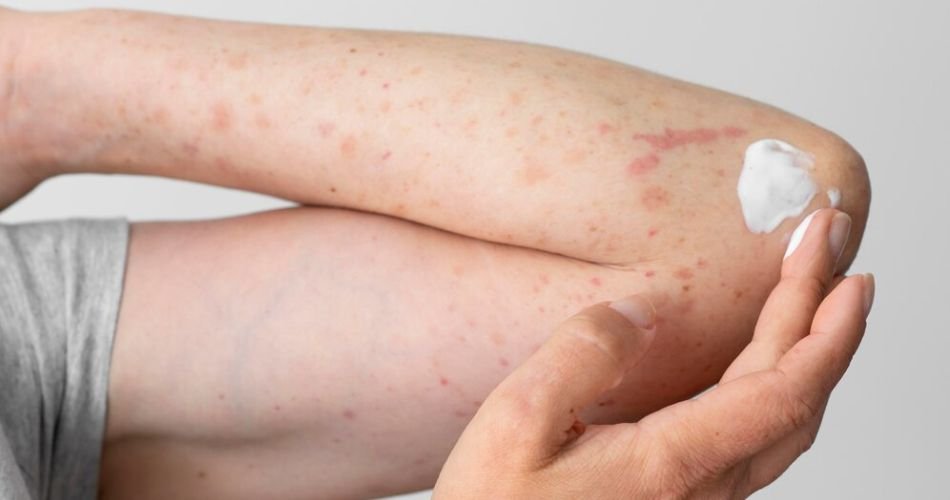The term skin crawling often evokes an instant and vivid image of discomfort, a sensation where it feels as if tiny insects are moving across your skin. Although sometimes it is used figuratively to describe emotional reactions such as fear, disgust, or anxiety, skin crawling can also refer to a very real physical sensation caused by various triggers. In the figurative sense, people use “skin crawling” to describe moments of intense unease, like hearing a disturbing story or witnessing something profoundly unsettling. On the literal side, actual nerve responses or skin conditions can provoke sensations that feel exactly like something is creeping across your skin. Our language shapes these experiences, intensifying emotions by giving them a tangible, almost physical, description that our minds and bodies respond to in powerful ways.
The Various Causes Behind the Sensation of Skin Crawling
There are numerous causes behind the feeling of skin crawling, ranging from psychological factors to physical conditions. Anxiety and fear are major contributors, with the body’s fight-or-flight response creating a hypersensitive state where even normal sensations can feel exaggerated and alarming. Medical conditions, such as neuropathy, fibromyalgia, or even vitamin deficiencies, can interfere with the way nerves send messages to the brain, resulting in misinterpreted signals that mimic the feeling of insects crawling on the skin. In some cases, the cause is not internal but environmental; insect bites, dry skin, or allergic reactions can create genuine crawling sensations. Recognizing the source of the sensation is crucial for finding effective relief, whether it’s treating an underlying health condition or managing emotional stress.
The Neurological Science Behind Skin Crawling Sensations
From a scientific standpoint, skin crawling sensations are deeply tied to the body’s nervous system. Our skin is embedded with millions of nerve endings that constantly communicate with the brain about touch, temperature, and pain. When these nerve endings become overly stimulated or damaged, they can send erroneous messages that the brain misinterprets, resulting in feelings of tingling, prickling, or crawling. In addition, the brain’s own chemistry can affect how these signals are processed. During times of high stress or emotional trauma, the brain can amplify normal sensory inputs, causing mild irritations to feel much more intense. These neurological reactions explain why stress or fear can seemingly make your skin crawl even when nothing is physically touching you.
Psychological Triggers That Make Your Skin Crawl
Beyond physical causes, there are strong psychological triggers that can provoke skin crawling sensations. Exposure to creepy imagery, unsettling sounds, or distressing emotional experiences can all cause a visceral physical reaction where the skin seems to shiver or tingle. For instance, watching a horror movie or listening to a chilling ghost story can stimulate your body’s fear response, resulting in the classic sensation of skin crawling. Even uncomfortable social situations, such as witnessing embarrassing or revolting behavior, can trigger similar feelings. These reactions are deeply rooted in the brain’s attempt to protect you from perceived threats by heightening your sensory awareness, even when the threat is purely emotional or social.
Medical Conditions That Are Associated with Skin Crawling
Several medical conditions are directly associated with persistent skin crawling sensations. One well-known condition is formication, a specific type of paresthesia that makes people feel like bugs are crawling on or under their skin. Formication can occur in various circumstances, such as during menopause, due to diabetes, or as a symptom of withdrawal from certain drugs. Restless Leg Syndrome is another condition where skin crawling sensations occur, particularly at night when trying to relax, making restful sleep nearly impossible. Fibromyalgia, a chronic disorder characterized by widespread musculoskeletal pain, can also lead to strange sensory experiences, including tingling, prickling, and crawling feelings. In these cases, the sensation is not just uncomfortable—it can significantly impact a person’s quality of life.
The Role of Anxiety and Chronic Stress in Skin Crawling Sensations
Anxiety and chronic stress play a significant role in creating or worsening skin crawling sensations. When a person is under stress, the body releases a flood of hormones like adrenaline and cortisol that heighten the senses and prepare the body for immediate action. While this response is vital for survival in genuinely dangerous situations, it can be harmful when activated too often or for too long. Chronic stress keeps the nervous system in a state of overdrive, making the skin hyper-responsive to stimuli and leading to sensations that feel abnormal or disturbing. Additionally, long-term anxiety can cause nerve pathways to become overly sensitive, meaning minor triggers are interpreted as intense, crawling feelings on the skin.
Skin Crawling Experiences During Sleep Disorders
Sleep disorders are another domain where skin crawling sensations frequently appear. Insomnia, characterized by the inability to fall asleep or stay asleep, often leads to an overactive nervous system that heightens skin sensitivity. When a person is sleep-deprived, the body’s natural healing processes are disrupted, making the nervous system more prone to misfiring. Another sleep-related phenomenon linked to skin crawling is sleep paralysis, a condition where the brain wakes up before the body, leading to terrifying experiences that often include the sensation of pressure, tingling, or crawling across the skin. These episodes are distressing and can make individuals dread falling asleep, creating a vicious cycle of poor rest and heightened sensory disturbances.
Understanding Parasthesia and Its Connection to Skin Crawling
Parasthesia is a clinical term used to describe unusual skin sensations like tingling, numbness, and crawling. These sensations can be temporary, such as when your foot “falls asleep” after sitting awkwardly, or chronic, indicating underlying nerve problems. Causes of parasthesia include pinched nerves, circulatory issues, diabetes, and neurological disorders such as multiple sclerosis. When parasthesia presents as persistent skin crawling, it often requires medical attention to diagnose and treat the underlying cause. Treatment can vary widely, from lifestyle changes and vitamin supplements to medications aimed at repairing nerve function or reducing inflammation.
Skin Conditions That Cause Crawling Sensations
Sometimes, the culprit behind skin crawling feelings is an actual skin disorder. Eczema, a condition marked by inflamed, itchy skin, can create sensations that mimic crawling or burning. The intense itching associated with eczema sometimes feels like bugs moving beneath the skin. Psoriasis, another inflammatory skin condition, causes thick, scaly patches that can also itch or sting, leading to similar sensations. These conditions often require targeted treatment with moisturizers, steroid creams, or systemic medications to reduce inflammation and provide relief from the uncomfortable crawling feeling.
Emotional and Psychological Impact of Persistent Skin Crawling
Living with persistent skin crawling sensations can take a heavy toll on emotional and psychological well-being. Over time, chronic discomfort can lead to heightened anxiety, depression, and even social isolation, especially if the individual feels embarrassed about their symptoms. Many people may fear they are imagining the sensations or worry that others will not believe them, leading to feelings of helplessness and frustration. The mind-body connection is powerful, and when physical symptoms are persistent and unexplained, they often exacerbate mental health challenges. Addressing both the physical and emotional aspects of skin crawling is essential for holistic healing.
Effective Management and Treatment Strategies for Skin Crawling
Managing and treating skin crawling sensations depends heavily on identifying the underlying cause. For mild, temporary cases, home remedies such as cool baths, moisturizing creams, and relaxation techniques like deep breathing or meditation can be highly effective. However, if the sensations are chronic or severe, medical intervention is often necessary. Doctors may prescribe medications that target nerve pain, recommend therapy for anxiety or stress management, or suggest lifestyle changes such as improved diet and regular exercise. In cases where a skin condition like eczema or psoriasis is the cause, dermatological treatments will focus on reducing inflammation and calming the skin.
Recognizing When to Seek Medical Help
While occasional skin crawling is usually harmless, persistent or severe symptoms warrant medical attention. Red flags include sensations that interfere with daily life, are accompanied by muscle weakness, significant pain, or changes in mobility. These signs could indicate underlying neurological conditions, circulatory problems, or serious skin disorders that require professional diagnosis and treatment. Trusting your body’s signals and consulting a healthcare provider can prevent small issues from becoming major health concerns.
Preventing Skin Crawling Sensations Through Lifestyle Changes
Prevention is often the best medicine when it comes to skin crawling sensations. Maintaining a healthy lifestyle by staying hydrated, eating a balanced diet rich in vitamins and minerals, and exercising regularly can strengthen the nervous system and skin health. Avoiding excessive alcohol, caffeine, and smoking also reduces the likelihood of nerve-related issues. Stress management is equally critical; practicing mindfulness, yoga, or cognitive-behavioral techniques can keep anxiety levels low and the nervous system balanced, minimizing episodes of skin crawling before they even begin.
Final Thoughts on Navigating Skin Crawling Experiences
Skin crawling sensations, whether fleeting or persistent, are deeply unsettling experiences that bridge the physical and emotional realms. While they can often be attributed to benign causes like stress or minor skin irritation, they may sometimes signal deeper health issues that require attention. Understanding the various factors—neurological, psychological, dermatological—that contribute to this phenomenon empowers individuals to seek appropriate care and find effective relief. With the right combination of self-care, medical treatment, and emotional support, it is entirely possible to manage and even overcome the disturbing sensation of skin crawling, allowing you to reconnect with your body in a way that feels safe and comfortable once again.




